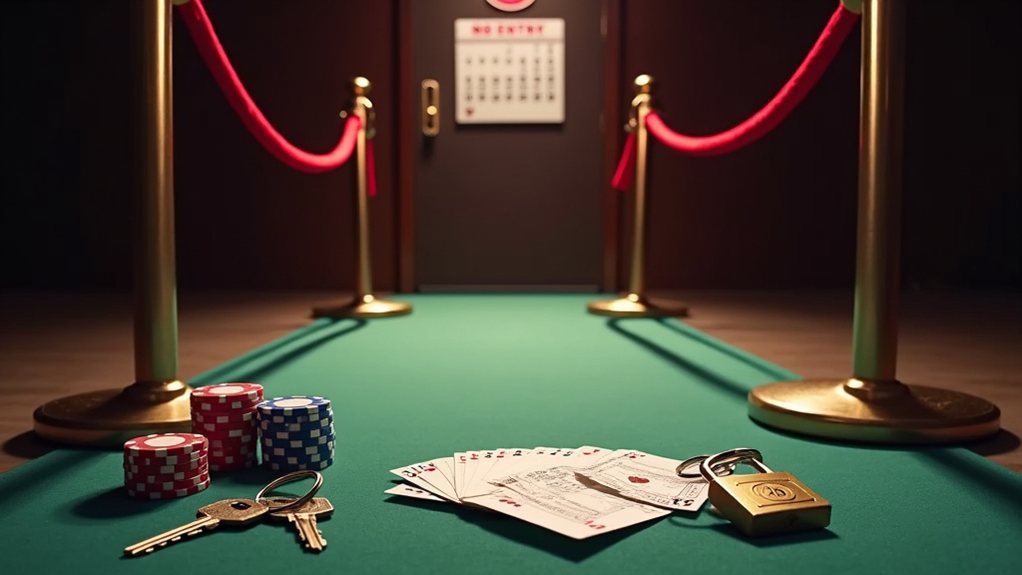Self-exclusion offers bettors a proven path to regain control over their gambling habits. This industry-standard tool allows players to voluntarily block themselves from betting activities for a set period. Sports bettors who recognize early warning signs can utilize self-exclusion programs across multiple platforms with a single registration. The gold standard in responsible gambling protection helps prevent financial strain and impulsive decisions. Don’t miss out on understanding how this crucial safeguard works and what legal protections it provides.
Understanding the Self-Exclusion Process for Problem Gamblers

When facing challenges with gambling habits, self-exclusion programs offer a practical solution for those seeking to regain control.
Self-exclusion provides a powerful pathway to freedom when gambling threatens to overtake your life.
These gold standard programs allow bettors to voluntarily ban themselves from gambling venues for specific timeframes—from six months to lifetime commitments.
The process is straightforward: individuals enroll, select their exclusion period, and agree to penalties for breaches, including trespass charges and forfeited winnings.
Don’t miss out on this proven strategy! Our fifth decade of experience shows self-exclusion works best when combined with counseling services and support groups.
Gaming operators maintain databases to enforce these bans, ensuring your commitment stays intact.
Self-exclusion programs have been shown to reduce gambling frequency and spending for many participants.
However, the effectiveness of self-exclusion ultimately depends on the gambler’s genuine commitment to stop gambling, as determined individuals may find ways to circumvent restrictions.
The Psychological Benefits of Taking a Break From Betting

Taking strategic breaks from betting offers substantial psychological benefits that extend far beyond simply stepping away from the action.
Research shows these intervals help bettors maintain emotional equilibrium and make more rational wagering decisions.
The key psychological benefits include:
- Reduced physiological arousal, preventing the emotional rollercoaster that often leads to poor betting choices
- Improved financial management through decreased impulsive behavior
- Development of alternative stress-coping mechanisms beyond gambling
- Improved decision-making abilities when returning to betting activities
Regular timeouts represent the gold standard in responsible gambling practices. These breaks allow individuals to practice mindfulness techniques that create space for reflection before returning to betting activities.
Many industry experts in their fifth decade of experience recommend scheduled breaks as crucial for maintaining betting as entertainment rather than compulsion.
Survey data reveals that bettors who implement betting limits consistently report higher satisfaction with their overall gambling experience.
Proper bankroll management strategies are essential during these self-exclusion periods to ensure financial stability when you return to betting activities.
How to Implement Self-Exclusion Across Different Gambling Platforms

Self-exclusion programs offer bettors a powerful strategy for maintaining control over gambling habits after recognizing the need for structured breaks.
Implementation varies across platforms, with physical casinos requiring formal applications through management, while online platforms provide options in their responsible gambling sections.
The process typically involves submitting personal details, selecting an exclusion timeframe, and completing identity verification. Durations range from six months to lifetime bans depending on the venue or site.
Regional regulations create different experiences—UK operators must participate in GamStop, while U.S. programs vary by state.
Recent technological advancements have improved convenience through centralized databases and external registration options, though enforcement challenges remain.
Legal Protections and Limitations of Self-Exclusion Programs
The legal landscape surrounding self-exclusion programs provides both significant protections and notable limitations for bettors seeking help with gambling issues. Bettors who enroll in these programs gain industry-standard protections while sacrificing certain legal rights.
Key aspects of self-exclusion programs include:
- Confiscation of any winnings obtained during breaches
- Potential trespass charges for violating agreements
- Varying enforcement standards across different jurisdictions
- Limited coverage across gambling platforms
These gold-standard programs remain voluntary by design, requiring personal commitment.
The effectiveness ultimately depends on both regulatory enforcement and individual compliance.
Don’t wait to take action if gambling has become problematic—understanding these legal frameworks is crucial for bettors considering this responsible gambling tool.
Finding Support and Resources During Your Self-Exclusion Period
While legal protections provide a framework for self-exclusion programs, individuals need robust support systems during their break from betting.
The gold standard for immediate assistance is 24/7 helplines like 888-ADMIT-IT, offering confidential support when urges strike.
Self-help groups, online programs, and peer support networks provide critical connections during recovery.
Gamblers Anonymous meetings and the Peer Connect Program let bettors share experiences with others who understand the challenge.
Professional counseling addresses underlying issues, while financial guidance helps repair monetary damage.
Don’t miss out on self-assessment tools and workbooks that can transform your exclusion period into a productive time for personal growth.
FAQs
Can Family Members Initiate Self-Exclusion on Behalf of a Problem Gambler?
In the case of James vs. Atlantic City Casino (2018), self-exclusion could not be initiated by his wife. Family members cannot legally initiate self-exclusion on behalf of problem gamblers, as the process must remain entirely voluntary.
Does Self-Exclusion Affect My Credit Score or Financial Records?
Self-exclusion does not directly affect credit scores or financial records. It may indirectly protect these by preventing gambling-related debt accumulation and promoting better financial discipline.
What Happens to My Existing Bets After Self-Exclusion Begins?
Existing bets typically remain valid after self-exclusion begins. Operators honor wagers placed before exclusion, allowing for collection of potential winnings while preventing new betting activity during the exclusion period.
Can I Maintain Social Casino Gaming During Self-Exclusion Periods?
Self-excluded individuals can typically access social casino games as they’re not legally considered gambling. These platforms often remain unrestricted since they don’t involve real money betting, though they may still trigger gambling behaviors.
How Is My Privacy Protected During the Self-Exclusion Process?
While privacy concerns may seem overblown, self-exclusion programs employ multiple safeguards: secure data storage, limited access authorization, strict sharing protocols, and compliance with privacy laws protecting personal information from unauthorized disclosure.







